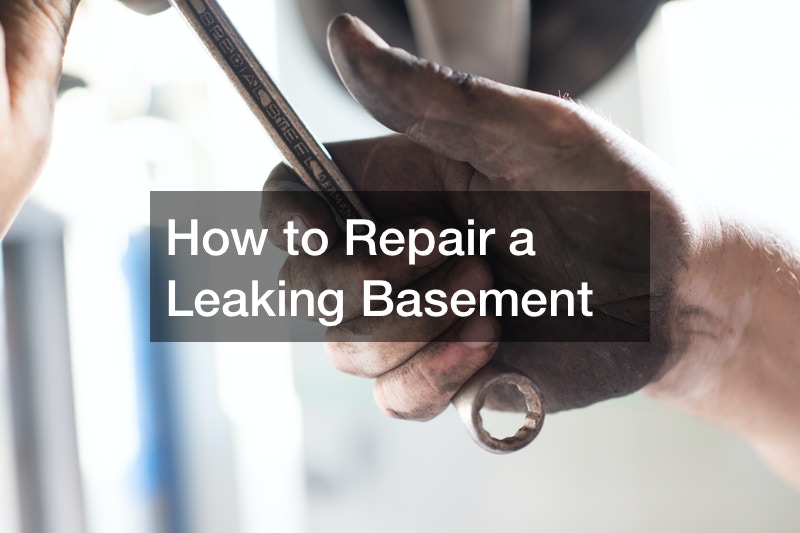
The thing about having a home is that you should be ready for anything. This means that regular maintenance is a crucial part of ensuring that your home is protected from any issues such as foundation repairs or similar. In most cases, it’s important for you to have a professional who can help you to determine what the main problem in your home is.
Problems such as a leaky basement from incorrect septic tank installs or cracked walls can end up costing you more than you’ve bargained for. If you don’t know much about fixing a wet basement, you’re not alone. A helpful guide should help you to understand more and find the best solutions. Read on to find out more about how you can identify and fix any leaks in your basement.
1. Find the Water Problem

The main issue with a leaking basement is that you have a problem with water or moisture that’s affecting it. This can come from one of two sources. You’re either dealing with indoor humidity or water vapor.
If you want to figure out what the main issue is, you should use some foil for good measure. If you have a high indoor humidity problem, you’ll notice visible moisture on the outside of your aluminum foil. If it’s water vapor that you’re dealing with, then the moisture will be visible behind her foil.
The best way for you to deal with a high indoor humidity issue is to contact your heating and cooling services provider.
Failure to stop any damage from a water problem in your home can lead to some of these consequences.
- The moisture can leak through the cracks.
- It can adversely penetrate through the concrete.
- Outside water can also enter the soil foundation in your basement.
2. Reduce Excess Humidity
The fact of the matter is that humid air is one of the major causes of a wet basement. Let’s say that you want to dry out your basement. Ensuring that you get rid of any sources that can heighten the amount of humid air is very crucial.
This should help you to avoid massive foundation repairs in your entire home. But how can you get rid of excess humidity without paying a hefty bill for it? The answer is very simple. These are some of the easiest options that you should consider.
- Seal any leaky vents with duct and foil tape.
- Have a vent fan as an addition in your bathrooms.
- Close your basement windows at the peak of humid weather.
- Invest in a dehumidifier to ensure that you reduce indoor humidity.
- Spend money on heating and cooling services repairs.
3. Insulate the Piping

Have you noticed that there are droplets that drip on your basement? If you’re not certain where these come from, you’re not alone. Yet, the main thing that could be causing any additional wetness in your basement can be condensation from cold pipes.
It’s very important for you to reduce the condensation if you wish to avoid a leaky basement. The main thing that you should consider is insulating your pipes. Stopping condensation from your indoor pipes is very easy.
You should invest in foam pipe sleeves. These are inexpensive options to protect your basement. In fact, you don’t even need to pay anyone to insulate your pipes for you. If you’re looking for an easy DIY project to keep you busy, you should consider taking this one on.
In the long run, protecting your pipes from condensation should help you in more ways than you can think of. For instance, it’ll ensure that you save money from calling your local plumber ever so often to fix this problem for you.
4. Insulate the Basement Walls

The fact is that there are various factors that lead to your basement leaking. In most cases, cracked or damaged walls can be a major cause for concern. In fact, condensation isn’t limited to affecting your pipes.
Your walls and other parts of your home can face this challenge. This is why it’s essential for you to have an adequate amount of insulation on your walls as well. Moreover, having insulation on your exterior walls should help you to save energy.
As a result, you’ll make sure that you reduce your heating costs by a margin. And, help you with reducing the amount of money that you spend on your basement waterproofers. However, when it comes to insulating your basement walls, there are a few things that you should know about the methods that are available to you.
First things first, it’s crucial for you to understand the type of basement insulation problems that your walls are faced with. Is The issue the type of material that your walls are built from? The thing is that if you didn’t go to your building supply store to buy the wall materials for your home, it’s common to not understand how the materials play a huge role in the condensation issues in your basement.
The following are the main methods that you should consider when it comes to ensuring that your basement is protected from any excess moisture.
- Use a spray foam to lock out any water vapor from the outside.
- Ask your building supply store for foam board products. These are generally more affordable than using spray foam.
- Opt for a hybrid system that includes foam boards and fiberglass. It’s more viable for reducing water infiltration in your basement.
- Consider using vapor barriers. However, do your research first because they can get complicated if you’re not familiar with them.
5. Fix Holes and Cracks in Your Foundation

Have you noticed that there’s moisture that seeps underneath your basement? If this is the case, then you should know that you’re likely dealing with a big problem in your basement foundation. There are likely cracks and holes that you wouldn’t suspect to cause damage in your basement.
If you’re looking for a short-term solution, then you should consider plugging them. Even though this won’t entirely solve your current problem, it should help to give you some time until you have a better idea of what to do. If you can get your hands on some hydraulic cement, it should help to reduce most of your leaky foundation issues.
However, it’s still important for you to do a thorough inspection to assess what could be the main cause of the leaks seeping through from your foundation. In some cases, you might find that you’re due for a water pump replacement. But, if you don’t know what the issue could be, you should consider assessing the following.
- The cracks in your foundation wall.
- Plumbing problems.
- Inadequately functioning downspout.
- A clogged perimeter drain that requires a drain cleaning service.
- Old patch work that requires some much-needed touch ups.
6. Install a Drainage System
You’d be surprised to find that there’s a way to permanently fix the issues that you have with your leaky basement. The most valuable way to ensure that your basement is protected from excess moisture is by installing a proper drainage system. This is ideal if you have major leaks that you don’t know how to fix.
Most importantly, when you have one system to curb the rest of the problems, you can have a sure way to keep it maintained. Having a proper drain service provider to install your drainage system is very important. For your basement, it’s essential to have drainage tubing that runs underneath your basement floor. Even though you can do this yourself, it’s always advisable for you to get someone who has more knowledge to help you.
If you have a concrete floor, there are things that you should consider such as burying the drainage tubing system. In addition, you should also know how to patch your floor once all of it is done.
7. Have a Moisture Barrier
In addition to having a drainage system, you should consider other alternatives. If you want to have a warmer and drier basement floor, it’s essential for you to know what you can use as a barrier in your basement. One of these solutions is drainage mats.
These offer you an excellent way to reduce any excess moisture on your floor. But, they also offer you great benefits such as providing your basement with an insulating layer of dry air. This is great in winter because your cold concrete and floor are separated. Making it easy for you to enjoy warmer evenings in your basement without worrying about excess water affecting your home.
This also helps to reduce any condensation and water vapor that can cause extensive damage to your foundation. These plastic drainage mats are also a more affordable solution that doesn’t require you to pay extra to cover any labor costs.
8. Conduct an Inspection
Knowing how to permanently keep water away from your home is very essential. If you know how to assess any leaks in your home, it makes it easier for you to figure out where the issue is. The problem is that it can be a bit difficult if you don’t know how to properly check the ground around your foundation for any excess moisture.
But, this is something that you can easily do in the comfort of your home. All that you need to do is to have a notepad to document all that you see. Having a tape measure should also help you to record the level of moisture that you observe.
9. Extend Your Gutters
In some cases, adding things like gutters in your home should be beneficial for your basement. The thing is, if you don’t have functional gutters in your home, your basement will always suffer. A gutter is a very essential structure that you should have to catch any excess rainwater.
This means that there’ll be a designated downspout that ensures that moisture doesn’t enter the soil in your foundation. It’s important to redirect water away from your home. If you already have gutters that are installed, you should ensure that they’re fully functional.
Getting a local plumber to assess the status of your gutters should help save you from significant future expenses. Moreover, he’ll know more about having the right horizontal extensions that should be moving water away from your home.
10. Have a Sump Pump Installed
The fact of the matter is that a drainage system in your basement can be a filthy business. It can also require regular cleaning. This means that you’re likely to get your hands dirty more often than you want to.
Yet, a sump pump should be something that you should consider. It can help to reduce the amount of work that you need to do to ensure that your basement system is taken care of. Additionally, it redirects all the waste in a proper way away from your basement.
Plus, once your sump pump starts giving you issues you can always call someone to fix it. As long as you remember to maintain everything in your basement drainage system, you should reduce any potential damage to your foundation.
In summary, knowing how to care for your basement is very important. In certain cases, you should consider the most effective way to reduce any leaks from it. There are times when preventative care such as having a dumpster rental service on standby is a very beneficial way to achieve this.
One of the easiest ways for you to prevent your basement from leaking is by using alternative waterproofing methods. Things like a tile and grout cleaner should offer you the ideal protection that you need to prolong your basement. If your home is susceptible to moisture, you should consider the other methods that have been mentioned in this helpful guide.
At the end of the day, any delays in fixing the leaky basement problems that you’re faced with can lead to you being in a worse position. It’s always important for you to prevent any further damage as soon as you can.



